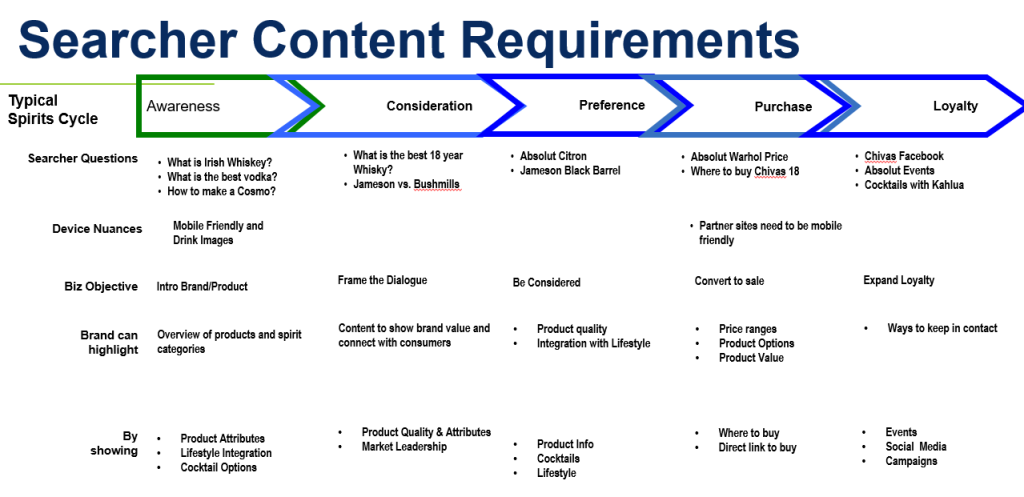What's The Future Of Search Marketing? 3 Clues From SMX East

Conferences have the nasty habit of inspiring and overwhelming their attendees at the same time. It’s not until this bombardment of ideas has time to settle into the unconscious that we can begin to truly appreciate what was being said by our industry leaders. These three ideas are what stuck after all the learning, hand shaking, and cocktail drinking was done at SMX East.
Embrace Answer & Knowledge Graph Results
The proliferation of answer results has been the biggest change to Google’s SERP landscape in the past year. In his presentation about direct answer search Eric Enge (who’s name I’ve been pronouncing incorrectly) revealed that his company tested over 850k search queries and found that 19% of them had a rich answer result. In his blog post detailing his findings Eric predicts that number will climb to 40% by the end of the year.
The number of presentations related to contemporary SERPs may be the best indicator of how much this subject will impact search marketers in the year to come. Nearly one-third of all SEO Track presentations were related to answer results, the knowledge graph, and how users are interacting with them.
I was surprised to find each presentation to be pretty straightforward. One of the better ones was by Ehren Reily. Ehren is Director of Product at Glassdoor and has fought some battles with websites like businessinsider.com when trying to get the answer result for “salary information.”
Often these sites will reference Glassdoor data and get the answer box, despite Glassdoor being the original source and having the #1 organic result.

Ehren’s presentation, “How to Win with Direct Answers as a Content Site”, had several great takeaways. Every direct answer follows a formula. Figure out the formula for the direct answer you want to appear in and create that sentence in your information. The answer result is not always populated by the most authoritative site, but the site that best follows the formula for that answer.
One of the biggest barriers to figuring our where you stand in the answer box landscape is finding and tracking opportunities. Conference sponsor STAT has developed a fantastic product that does this effectively. The software doesn’t just give your position for each keyword tracked, it also tells you when there is an answer and/or knowledge graph result present in the SERP and how it’s affecting your position. That daily opportunity analysis is a dream come true for anyone looking for a way to capitalize on answer results.
The most interesting thing about Ehren’s presentation was he never used the word schema. All of his recommendations used HTML structure and title tags to achieve the answer result placement.
As good as all of that sounds, SMX-appointed curmudgeon Marshall Simmonds was not shy about voicing caution when giving Google what it wants. We have seen Google release recommendations like HTTPS which are later are retracted.
His caution is sound. Take your time and think through the possible implications of giving Google access to all of your data.
Get Into The Mind of The Customers
“The advertising man studies the consumer. He tries to place himself in the position of the buyer. His success largely depends on doing that to the exclusion of everything else.” – Scientific Advertising, 1923
During his presentation Wil Reynolds used Scientific Advertising to anchor his presentation in PEOPLE, not Algorithms. It’s a message he has been trumpeting for a while now, trying to get search marketers out of the keyword planner and into the minds of actual people. In his presentations he makes the astute observation that “understanding how people make decisions is a skill that is undisputed and is a greater skill than understanding how Google works.”
I couldn’t agree more with Wil. Understanding how Google works allows you to audit your website and fix what’s broken. Anything beyond that requires you to put on your advertising hat and understand what the product does and who it’s for.

Source: https://www.useronboard.com/features-vs-benefits/
Bill Hunt echoed this same idea in detail during his presentation “Understanding The Voice of the Customer”. Where Wil Reynolds was more inspirational, Bill’s presentation was informational. Bill talked about the process of keyword research and content identification and how to do it properly. It’s more than just keyword volume, it’s about understanding the customer, their position in the buying process (awareness, consideration, preferences, purchase, loyalty), and providing answers in the format that they want.

Bill’s best slide (above) outlined how he maps this process for clients. Each step lays out the questions a customer is asking, the device and content format expected, the business objectives solved, brand highlights, and what each piece of content should include. It’s a very practical look at how to implement Wil’s ideas, and one I will be researching and using in the future.
These presentations hint at a broader trend of search marketers thinking more holistically about marketing. It speaks to the evolution of our SEO roles from algorithm chasers to full-blown marketers. SEOs have the opportunity to use research and reporting to help marketing teams anticipate the needs of their customers through their research and reporting.
Technical & On-Page SEO are Table Stakes
Technical and on-page optimization should earn a permanent place on every “important in the year ahead” SEO list. By now even the most laggard digital marketers know of SEO, its importance, and its best practices. Implementing those best practices is, and will always be, the challenge.
The hurdle with implementation is communication. SEOs must not only prioritize audit findings but also distill them into messaging that resonates with development, marketing, and the C suite. Each of those people need to understand not just the what, but also the why, to a degree that they feel incentivized to recommend and fight for the recommendations to be implemented.
Getting it right is no easy task as fellow SMX East attendee Matt Bailey can attest:
One of the more brilliantly simplistic ideas of the three days [was to] create SEO infographics for internal training. One of the challenges I face every day is how to cater to the different skill sets of our organization, and efficiently explain SEO principles in a way that makes sense to each group of individuals. A small handful of uniquely tailored SEO infographics will allow me to very quickly and easily lay out basic SEO principles in a multitude of different ways, that speak directly to a team’s daily responsibilities.” – Matt Bailey, Johns Hopkins Medicine
The importance of communication was sprinkled throughout many of the presentations at SMX East to complement the presenters’ main points. But the importance of good communication is amplified when you’re talking about technical and on-page SEO. Together they are the foundation of a successful website; if not implemented correctly (or at all) the whole house will fall down.
“Think twice before you speak, because you words and influence will plant the seed of either success or failure in the mind of your listener.” -Napoleon Hill
The presentations below are great for those looking to understand the audit process from start to end, including how to communicate. I would add that anyone looking to up their communication skills would be wise to add “Pitch Perfect” by Bill McGowan to their reading list.
Thank you to my fellow attendees for their help creating this article.
Sean Burton of Hallam
Matt Bailey of Johns Hopkins Medicine
Books to Check Out
Scientific Advertising by Claude Hopkins (free verions here)
Pitch Perfect by Bill McGowan
Slide Share Presentation About Contemporary SERPs
Eye Tracking Update: How Users View & Interact With Contemporary Google Search Results by Chris Pinkerton
Google’s Rich Answers in Search – How to Make Them Work For You by Eric Enge
Turning Direct Answer Lemons into Lemonade by Amber Fehrenbacher
How to Win With Direct Answers as a Content Site by Ehren Reily
Optimizing Content for Knowledge Graph Results by Jaimie Abir
Hacking the Knowledge Graph and Becoming an Online Entity by Tony Edward
164 Years of Entity Based SEO by Evan Sandhaus
Google: The Good, The Bad, The Worse, and The Confusing by Marshall Simmonds
Google Now, Microsoft Cortana & The Predictive Search World by Cindy Krum
Slide Share Presentation About Technical & On-Page SEO
The SEO Audit: Purpose, Discovery, and Planning by Jessie Sticchiola
Tools of the Trade for Running SEO Audits by Ben Arriola
Important Audit Tactics and Best Practices by Bill Hartzer
Directed Diagrams for Teaching & Analysis by Ian Lurie
Thousands of Pages Missing From Google SERPs…And How to Prevent the Problem! By Christine Smith


